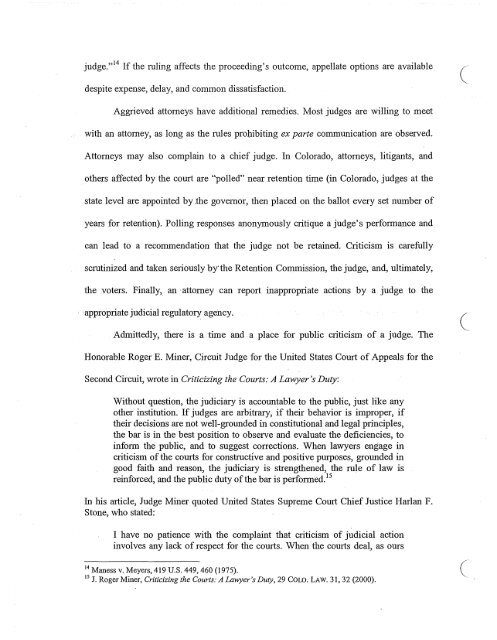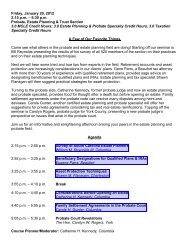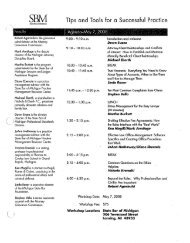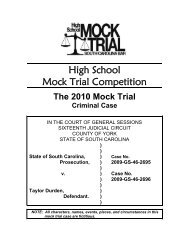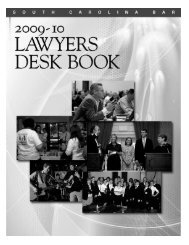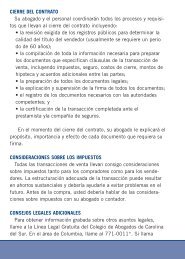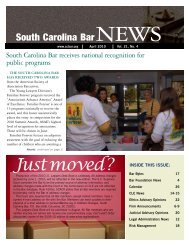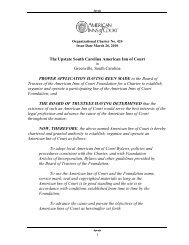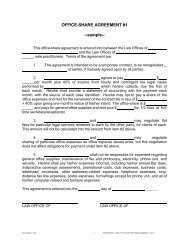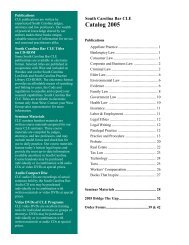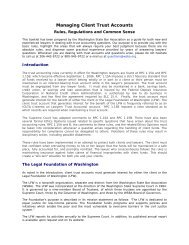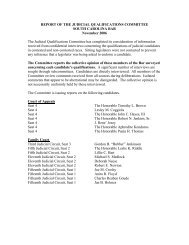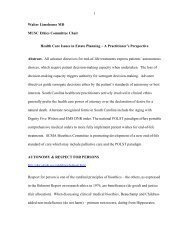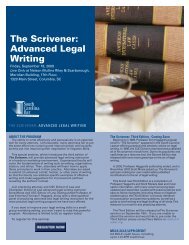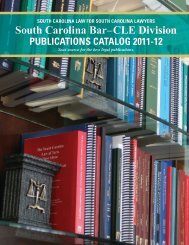Practicing With Professionalism - South Carolina Bar Association
Practicing With Professionalism - South Carolina Bar Association
Practicing With Professionalism - South Carolina Bar Association
You also want an ePaper? Increase the reach of your titles
YUMPU automatically turns print PDFs into web optimized ePapers that Google loves.
judge.,,14 If the ruling affects the proceeding's outcome, appellate options are available<br />
despite expense, delay, and common dissatisfaction.<br />
(<br />
Aggrieved attorneys have additional remedies. Most judges are willing to meet<br />
with an attorney, as long as the rules prohibiting ex parte communication are observed.<br />
Attorneys may also complain to a chief judge. In Colorado, attorneys, litigants, and<br />
others affected by the court are "polled" near retention time (in Colorado, judges at the<br />
state level are appointed by Jhe governor, then placed on the ballot every set number of<br />
years for retention). Polling responses anonymously critique a judge's performance and<br />
can lead to a recommendation that the judge not be retained. Criticism is carefully<br />
scrutinized and taken seriously by-the Retention Commission, thejudge, and, ultimately,<br />
the voters. Finally, an attorney can report inappropriate actions by a judge to the<br />
appropriate judicial regulatory agency.<br />
Admittedly, there is a· time and a place for public criticism of a jUdge. The<br />
(<br />
Honorable Roger E. Miner, Circuit Judge for the United States Court of Appeals for the<br />
Second Circuit, wrote in Criticizing the Courts: A Lawyer's Duty:<br />
<strong>With</strong>out question, the judiciary is aGcountable to the public, just like. any<br />
other institution. If judges are arbitrary, if their behavior is improper, if<br />
their decisions are not well-grounded in constitutional and legal principles,<br />
the bar is in the best position to observe and evaluate the deficiencies, to<br />
inform the public, and to suggest corrections. When lawyers engage in<br />
criticism ofthe courts for constructive and positive purposes, grounded in<br />
good faith and reason, the judiciary is strengthened, the rule of law is<br />
reinforced, and the public duty ofthe bar is performedY<br />
In his article, Judge Miner quoted United States Supreme Court Chief Justice Harlan F.<br />
Stone, who stated:<br />
I have no patience with the complaint that criticism of judicial action<br />
involves any lack of respect for the courts. When the courts deal, as ours<br />
14 Maness v. Meyers, 419 U.S. 449, 460 (1975).<br />
15 J. Roger Miner, Criticizing the Courts: A Lawyer's Duty, 29 COLO. LAW. 31,32 (2000).<br />
(


